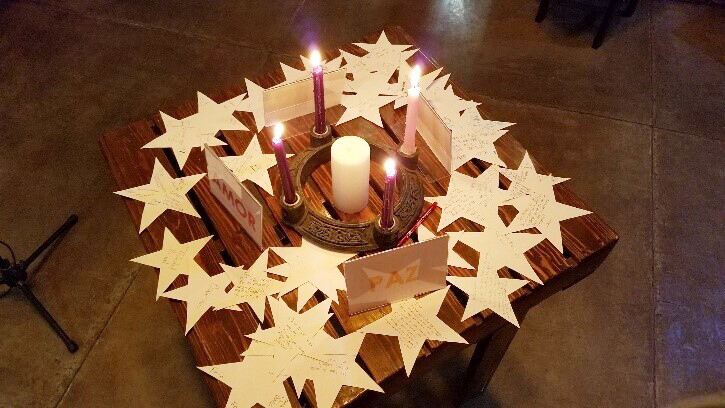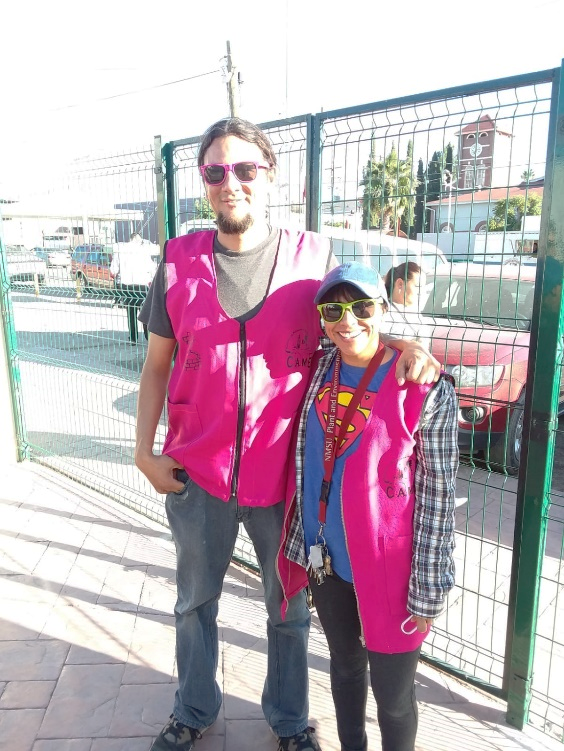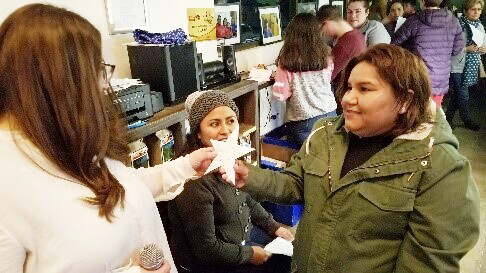A Letter from Mark Adams and Miriam Maldonado Escobar, serving at the Mexican Border
Epiphany 2020
Write to Mark Adams
Write to Miriam Maldonado Escobar
Individuals: Give to E200302 for Mark Adams and Miriam Maldonado Escobar’s sending and support
Congregations: Give to D506011 for Mark Adams and Miriam Maldonado Escobar’s sending and support
Churches are asked to send donations through your congregation’s normal receiving site (this is usually your presbytery)Churches are asked to send donations through your congregation’s normal receiving site (this is usually your presbytery)
“The people who walked in darkness have seen a great light; those who lived in a land of deep darkness — on them light has shined.” — Isaiah 9:2
We are grateful to God for the light that shines in unexpected places, the light that allows us to see and experience hope in the midst of despair; peace in the midst of a conflicted border; joy in the midst of a community beset with sadness; and love in the midst of a world filled with fear and hatred.
There are times when the darkness seems overwhelming.
Earlier this year, large numbers of families fleeing extreme violence and poverty began arriving in Agua Prieta. They are coming in hopes of seeking asylum in the United States through the legal process at ports of entry.
However, they have arrived at a time where our government has closed the door tighter, not only for persons entering between ports of entry, but also those seeking legal entry. Families are having to wait for months in border communities where they are targets of extortion, kidnapping, and sexual and physical violence.
Our partner at the CAME migrant shelter began receiving threats because they were giving rides to families from the bus station to the migrant shelter. For their own safety, our partners at CAME stopped giving rides. However, Grupo Beta, the Mexican arm of the National Institute of Migration in charge of providing protection to migrants, then picked up that role.
On March 22 (2019), I got a call from CAME telling me that two young men working for organized crime intercepted the Grupo Beta truck with a father, Jose, and his six-year-old son, Emanuel, before they could leave the bus station. The two men told the Grupo Beta officer that “for his safety and the safety of his family, the father and the son had to go back into the bus station and either pay the $500 per person fee to get out to the station or return to where they came from.” The officer told Jose and Emanuel to go back into the station.
Thinking that my status as a U.S. citizen would provide what was needed to get the family out, I went to the bus station accompanied by my colleague, Joca, who would stay in the car and be ready to make calls if necessary. Before I even entered the bus station, I heard a young man I did not recognize say, “Que hubole (what’s up), Marcos?” He was squatting by the door.
I entered the station with a teddy bear and a big welcome for Jose and Emanuel and asked them if they were ready to go to the church. We talked briefly and headed out the door to find safety. The young man who had greeted me upon entering was awaiting us as we got into the car. “Que estás hacienda, Marcos? What are you doing, Marcos?”
“We are going to the church,” I said, trying to sound confident.
“You can’t do that, Marcos. They have to stay in the station, pay their exit fee or go back to Nogales.”
Jose and Emanuel had already gotten in the car. Another young man had begun taking pictures of the car and me and was now talking on the phone evidently giving an update to their cartel supervisors.
I continued to insist that we could go to the church and the young man continued to “apologize” and say it just wasn’t possible. After a couple of minutes, Jose and Emanuel got out of the car. Jose shook my hand and said, “Muchas gracias, but we don’t want to cause problems — we are going back in the bus station.”Joca and I decided to use an emergency fund of FDC and were able to buy them tickets back to Nogales. The next day, in a Mexican version of Uber, they came back to Agua Prieta and arrived directly to the CAME, where Jose and Emanuel were reunited with their wife and mother. The three found welcome, safety, and love as they awaited their turn to apply for asylum at the U.S. Port of Entry.
After being rejected by the violence and poverty of his home community, fleeing with his parents, seeking refuge, being denied entry into the U.S. asylum process and facing cartel threats, Emanuel was finally welcomed at the CAME. Light shined on a family who had walked through deep darkness seeking refuge and in a city where organized crime casts an ominous pall. And through Emanuel and his family, light shines on us and shines on policies of exclusion and actions of violence.
The border has been the place of many epiphanies—a place where God has manifested challenging truths—truths that have always been in the sacred text, but I have read them with lenses that have distorted my understanding. Yet the border provides a lens to understand the gospel more fully.
Reading of the birth of Jesus, Emmanuel, we remember that he was born into a dangerous world. We remember that Herod and his government did not welcome him and sought to kill him. We remember that he continues to come to us today—in a six-year-old boy with his father stuck in a bus station; in families fleeing violence and poverty, in persons struggling with addictions, in children who are at risk of dropping out of school and in many unexpected places. The light shines in the darkness.
Miriam and I are grateful to God to serve with Frontera de Cristo, a community of faith that seeks out places of darkness, trusting that God’s light will be manifest and shine in and through us. We are grateful for your partnership in ministry that gives us the opportunity to accompany a community where the darkness sometimes can seem overwhelming, and yet the light of Christ shines.
P.S. At our Advent service at Café Justo y Mas, participants (from many faith traditions, economic and social statuses, from both sides of the border, some actively battling addictions, others living in recovery for years, young and old) shared their prayers for peace, hopes, joy and love by writing them on stars that will be strung in the coffee shop through January. We invite you to send us your prayers and we will read them, pray them, write them on a star and string them up in Cafe Justo y Mas with the prayers of your sisters in Agua Prieta.
![]() You may freely reuse and distribute this article in its entirety for non-commercial purposes in any medium. Please include author attribution, photography credits, and a link to the original article. This work is licensed under a Creative Commons Attribution-NonCommercial-NoDeratives 4.0 International License.
You may freely reuse and distribute this article in its entirety for non-commercial purposes in any medium. Please include author attribution, photography credits, and a link to the original article. This work is licensed under a Creative Commons Attribution-NonCommercial-NoDeratives 4.0 International License.


